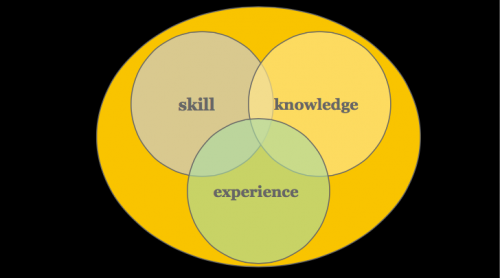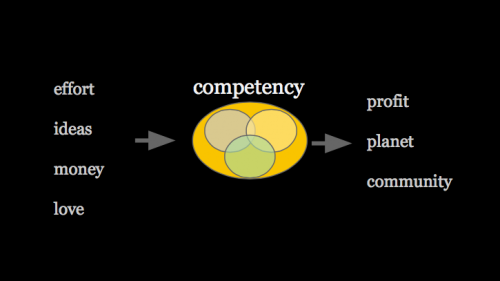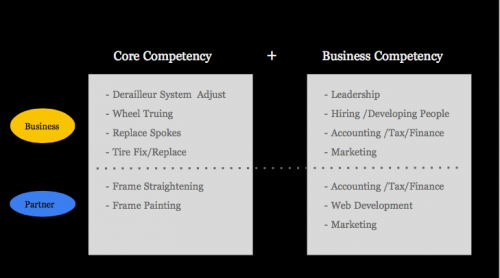Difference between revisions of "Workshop 8 - Competency, Part 1"
| Line 66: | Line 66: | ||
[[Image:core and business.png|right|500px]] | [[Image:core and business.png|right|500px]] | ||
| + | |||
| + | The Bike Repair Business: | ||
| + | |||
| + | Types of competencies (charts) | ||
| + | * Core competency (chart for bike business) | ||
| + | * Business competency (Chart for bike business) | ||
| + | |||
| + | For each of the above core competencies, ask: am I just a novice at some of these? proficient? expert? world class? Understanding of where you are here. | ||
| + | |||
| + | For each of the business competencies: Many areas that need to be covered, either within the company or outside. | ||
| + | |||
| + | Curt: core competencies are not enough and you end up spending a lot of time and energy on the business competencies. If you want to be a professional painter with your own business, painting will end up being a small part of it. | ||
| + | |||
| + | If you have many of the business competencies, can you start a business without core competencies? | ||
| + | |||
Revision as of 17:04, 26 February 2014
This page is being edited....
Competency: n. The ability to do something successfully or efficiently.
Competency is at the core of any business, and because of the importance of competency in sustainable business, it’s important to get a framework around it, form a common language around it. We don’t always know what we mean by competency, or if we do, we aren’t good at communicating it to others.
3 foundations of competency:
- Skill: knowing how to do something
- Knowledge: keeping up to date; knowing what’s going on in the field in which you work
- Experience: being able to say that you have done work in your skill area.
Competency = Photosynthesis: Competency is to sustainable business what photosynthesis is to a plant’s biology: photosynthesis changes energy from the sun into plant growth. Competency takes in energy in the forms of effort, ideas, money, and love, for example, and creates value in business: profit, nurturing the planet, up-lifting the community. If you don’t have competency in something, you can put time, energy and money into a business without getting anything out. Competency is vital, especially to get to the triple bottom line of a sustainable business.
Depth of competency:
- Understanding: You have a basic understanding of the skill; understand the terminology.
- Novice: You are in the process of learning and developing a deeper understanding of the skill.
- Proficient: You have enough competency in that skill area to be able to perform the task at a market-based rate.
- Expert: You are highly proficient in the skill; expert level might be enough for the majority of the skills you need for your business.
- World Class: You don't need to be world class at all that you do, but it's great if you can achieve that level in one or two areas of your business.
Be willing to learn: You don’t have to be an expert or at a world class level to start a business, but you do have to be ready, able and willing to learn. The learning process is what is most important. Almost everyone has been a novice in their career, but you have to have a clear understanding of where you need go and how to get there.
Your organization should have a learning culture - work with people who are in the learning process as well.
Capacity: For a service oriented business, achieving the expert level is a measure of your capacity. Capacity is related to competency and number of people available to do the work.
Standards are always shifting: What once was an expert is now a novice - you have to be continually learning, updating, changing. Rule at Accenture: "Every 7 years, everything you know is wrong."
Specialization:
This chart demonstrates the breadth of competency, or specialization, that someone might need to have in a particular field. If you were looking for an attorney, for example, what areas of specialization might you need? If you, yourself, are not 3 tiers deep in your understanding of this skill, then you aren’t near where you need to be. So you need a navigator, someone to help you navigate this space who can help you find the right person with the correct specialized skills that your business requires.
The Bike Repair Business:
Types of competencies (charts)
- Core competency (chart for bike business)
- Business competency (Chart for bike business)
For each of the above core competencies, ask: am I just a novice at some of these? proficient? expert? world class? Understanding of where you are here.
For each of the business competencies: Many areas that need to be covered, either within the company or outside.
Curt: core competencies are not enough and you end up spending a lot of time and energy on the business competencies. If you want to be a professional painter with your own business, painting will end up being a small part of it.
If you have many of the business competencies, can you start a business without core competencies?






